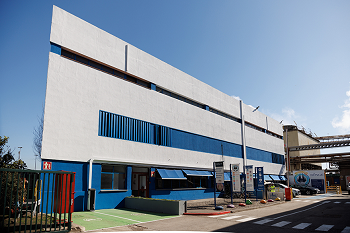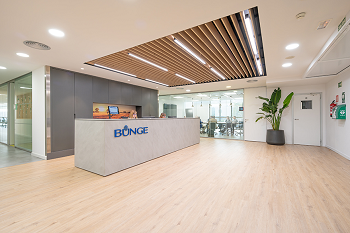Bunge has over 500 employees in Spain and plans to hire another 20 in 2024 for technology and digital tasks.
Specialised in oilseed processing, multinational agri-food products company Bunge, which came into being in the Netherlands in 1818, is one of the world's leading producers and suppliers of specialty vegetable oils and fats. Now based in the United States, it connects farmers with consumers to supply essential food, compound feeds and fuel.
It has been operating in the agri-food products industry in Spain since 1998, and has three soybean crushing plants in Barcelona, Escombreras (Cartagena) and Ziérbena (Bilbao), with its offices in the Catalan capital acting as a hub from which it provides support services beyond the Spanish market.
Bunge is committed to creating alternative routes for decarbonising the agricultural and oil supply chains in its industry and has recently announced strategic alliances with Olleco and Repsol. In Spain, it has also been involved in R&D projects, such as AccelerEAT, which has been selected by the Strategic Project for Economic Recovery and Transformation (PERTE) in the agri-food products industry, promoted by the Ministry of Industry, Trade and Tourism.


What are the major milestones of Bunge's presence in Spain?
Bunge has been committed to local talent and sustainable business growth in Spain for over 20 years, with continuous investment in the modernisation and expansion of its facilities and business lines. These include the start of our industrial activity in 2001 and the construction of new plants in Bilbao and Cartagena (2006-2007), the renovation of our industrial facilities and offices in Barcelona (2020 and 2023), and our most recent strategic alliances with Olleco and Repsol to help reduce carbon emissions in the agricultural and oil supply chains. In 2023 alone, we created 65 new positions at the Barcelona office, from where 280 professionals serve the local market and countries in Europe, Asia, Africa and Australia.
How important is Spain for the company's international strategy?
Spain is a country with great weight in the agro-industrial sector and the largest producer of compound feeds in Europe, so it is a very important market for us. We work with all stakeholders in this chain – from farmers and ranchers to logistics stakeholders and food and energy companies – in order to foster the development of this economic driver and bring sustainable, high-quality food, compound feeds and fuel to where it is needed. Spain is a strategic logistics hub for Bunge and our global supply chain. From here, we serve the national and European market, as well as countries in North Africa.
You have three soybean processing and biodiesel production plants. How did you enter this second market?
In 2008, we entered the biofuels industry after completing the construction of our biodiesel plant in Bilbao, one of four such plants we operate in Europe. Since then, we have been supplying biodiesel produced in Bilbao to the domestic market, the EU and the United States. Activity in this industry is part of a broader commitment to creating alternative routes for decarbonising agricultural and oil supply chains. In this regard, we have also just announced a key partnership with Repsol to jointly boost the supply of renewable fuels. This partnership represents a further step in our commitment and continued adaptation of Bunge's assets to the growing demands for low-carbon food, compound feeds and fuel.
In the oil market, you have set up a joint venture subsidiary with the British company Olleco. What role will Spain play in this market?
At Bunge, we provide the food industry with high-quality sustainable oils. Olleco Bunge collects and processes used oils so that they can be used to produce biodiesel and thus be given a second use. The aim is to provide sustainable solutions for food oils, which promote the circular economy. This not only applies in Spain, but also across the rest of Europe.
You have just refurbished your Barcelona hub. What tasks are performed at this centre?
From our hub in Barcelona, we provide services to regional and global teams, especially to markets in Europe and Asia, in addition to our national activities. From this office, our teams support the whole of Western Europe in areas such as finance, procurement, project management, legal services and human resources. We have teams that handle the execution and administration of our business transactions in Europe, the Middle East and North Africa. Furthermore, we have a great team of professionals there covering the fields of industrial operations, systems, corporate communications and auditing. We have adapted our workspace to the team's growth (with 65 new jobs created over the past year) and have implemented new ways of working to respond to the needs of today and the future, and to foster collaboration and innovation. It has been an important investment for us, and a new firm commitment to the talent and work being done here.
How many employees do you have in Spain?
In Spain, we have a team of over 500 people. We are committed to sustainability and continuously progressing with the digitalisation of our operations and innovation. These are key areas for Bunge that require the incorporation of more profiles in these fields: digital engineering, automation and interconnection of industrial operations systems, scientific and environmental studies, regenerative agriculture and development of food ingredients. In fact, we plan to create around 20 more jobs in 2024 linked to technology and digital initiatives.
You are part of the AccelerEAT project, which will receive 19 million euros from the agri-food products PERTE. What is Bunge's role?
AccelerEAT encompasses collaborative RD&I, sustainability and energy efficiency projects to improve the competitiveness and productivity of the agri-food industry of the future. Bunge is one of the 18 companies promoting this innovation project, and we have presented several initiatives for environmental efficiency and digitisation, as well as self-generation of renewable energy. One of these relates to the recycling and recirculation of water for our cooling system, which will allow us to significantly reduce water consumption, energy and the associated carbon emissions. In collaboration with the food industry companies promoting the project, we will in addition participate in creating a platform for calculating the carbon footprint of end food products, not only taking into account the industrial side (this is something that Bunge already calculates) but the entire value chain, from the origin of the raw materials to the end consumer.
What other investments are you making in R&D in Spain?
One of our main focuses is smart manufacturing or Industry 4.0, which combines advanced production and operations techniques with integrated smart technologies to further advance efficiency, sustainability, quality and food safety. Barcelona and Cartagena are global pilot plants, where we are currently developing AI and predictability projects.
What are your next challenges?
Climate change is a reality we are all facing and adds a new dimension to the challenge of food security, which is fundamental to Bunge. We have set some of the most ambitious targets in the industry, such as our commitment to no deforestation by 2025 and emissions reductions by 2030. We are working to minimise our environmental impact and meet the needs of consumers and communities. This requires comprehensive actions throughout the entire value chain: from the origin, through regenerative agricultural practices, to the energy transition, in order to contribute to decarbonising industry, and in addition to actions that promote the circular economy, such as reusing water in our production processes and generating alternative energy sources from waste. However, it also requires changes in our eating habits and continuous adaptation to new food trends.
Photos: Bunge



